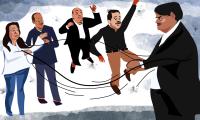If India builds the bomb, we will eat grass or leaves, even go hungry. But we will get one of our own.' declared Zulfikar Ali Bhutto, the late prime minister of Pakistan, the man responsible for not only enlisting A Q Khan in a successful bid to steal nuclear secrets but also for pitching Pakistan along the path of Islamic fundamentalism.
Both his wishes have come true. Pakistan has the bomb and its people are eating grass.
The BBC's web site reported that quake affected residents in as yet inaccessible areas have resorted to eating grass in order to survive. The quake has once again brought Pakistan to the fore of international concerns with aid spigots being rushed open.
It was barely four years ago when September 11th had a similar effect. Along with discredited ideas like the notion that poverty begets terrorism, the US and its allies chose to disregard the very democratic ideals that they claimed to be fostering by ignoring General Pervez Musharraf's repeated subversion of democracy.
In the name of fighting terrorism, billions of dollars have flowed to the only stable institution that Pakistanis and Pakistan has ever known, the military. However, for India the many challenges brought about by the earthquake also present opportunities to counter the many falsehoods about India's situation with regard to Kashmir.
'Terrorism may still derail peace process'
Apart from the calamitous effect of burying thousands, the quake also laid bare the considerable terrorist infrastructure in Pakistan occupied Kashmir. Britain's Daily Telegraph newspaper had two reports, one by Rahul Bedi and another by the respected Pakistani commentator, Ahmed Rashid, that made explicit references to the epicenter of the quake as being the epicenter of the many jihadi camps.
The Financial Times of Britain also had an article quoting Shireen Mazari, director of the Institute of Strategic Studies in Islamabad, who asserted: 'We do not want them surveying the lie (sic) of the land assessing the damage to military (read terrorist) assets. Mazari was referring to the offer by India of helicopters for relief efforts.
Translated, these reports and comments, for the first time, amount to nearly transparent third party comments about Pakistan continuing to use terrorism as an instrument of foreign policy. Such revelations have, heretofore, never seen the light of day.
In fact, Western intelligence sources have been quoted as being aware that many of the terrorist camps in Pakistan occupied Kashmir continue to nurture and train Al Qaeda terrorists besides jhadis who cross the Line of Control to kill both civilians (often Muslims) and Indian Army personnel.
With schools destroyed, madarssas beckon
Despite the foregoing, a clutch of Western commentary in the US and Europe has centered on the need to nudge India and Pakistan further along the peace process with the quake forming the basis of the new impetus.
Apart from the astounding moral equivalence implied, such decades old thinking continues to ignore the democratic deficit in Pakistan that has contributed not only to the enduring plight of average Pakistani citizens but also to the growing worldwide terrorist threat.
The Indian government would do well to publicly, if subtly, highlight development in the entire state of Kashmir including the contrast between infrastructure and responses on either side of the LoC. Along the same lines of affected impartiality, Western media and, in particular, the New York Times has focused on reports of supposedly inadequate responses by the Indian government. Presumably that was intended to suggest an impartial assessment that necessarily has to fault both countries.
In reality, these reports rely on skewed data designed to feed the false sense of even-handedness. The rapid response by the Indian Air Force to affected areas in Uri and elsewhere ought to be showcased by the government at every available avenue as an instance of what actually occurred on the ground.
Lastly, the absurdity of a suggested settlement, reflecting the aspirations of ordinary Kashmiris, between a military regime and a democratic and accountable government, seems to have eluded observers in the West.
While India has surely gained time in going along with the peace process, Indians are aware that there is little likelihood of substantive settlement while both the military and terrorists (if a distinction can be made between the two) continue to shape Pakistan's national and foreign policy goals.
General Musharraf's praise of Prime Minister Manmohan Singh's offer of aid notwithstanding there is no hint of any tangible move in the direction of peace. It is unlikely that brownie points from someone intent only on one-upmanship, if not destruction of his opponent, will accrue to India's benefit.
The government could consider lifting a page out of Israel and Ariel Sharon's book when the latter refused to deal with Yasser Arafat to the very end. Both the preceding Indian government and the present one have done nothing to insist on a democratic counter-party across the border.
Let Pakistan not set the agenda!
Shockingly, the present government, in fact, has taken to tacit if not open engagement of terrorist leaders in Kashmir whose stock-in-trade is bullets not ballots. If some of the above sounds like exploiting a natural calamity it is meant to. After all, good governance does include the perception amongst the governed that theirs is the best that votes can get.
For millions of ordinary Pakistanis votes have historically meant nothing while their military continually leaves them deprived of the ability to control their destiny. A natural disaster offers the best opportunity to contrast the respective governments with the ultimate goal of bringing peace to the Indian subcontinent.








